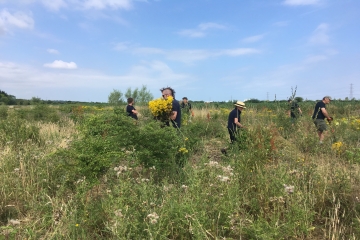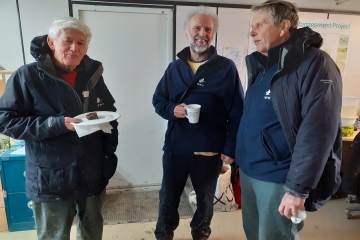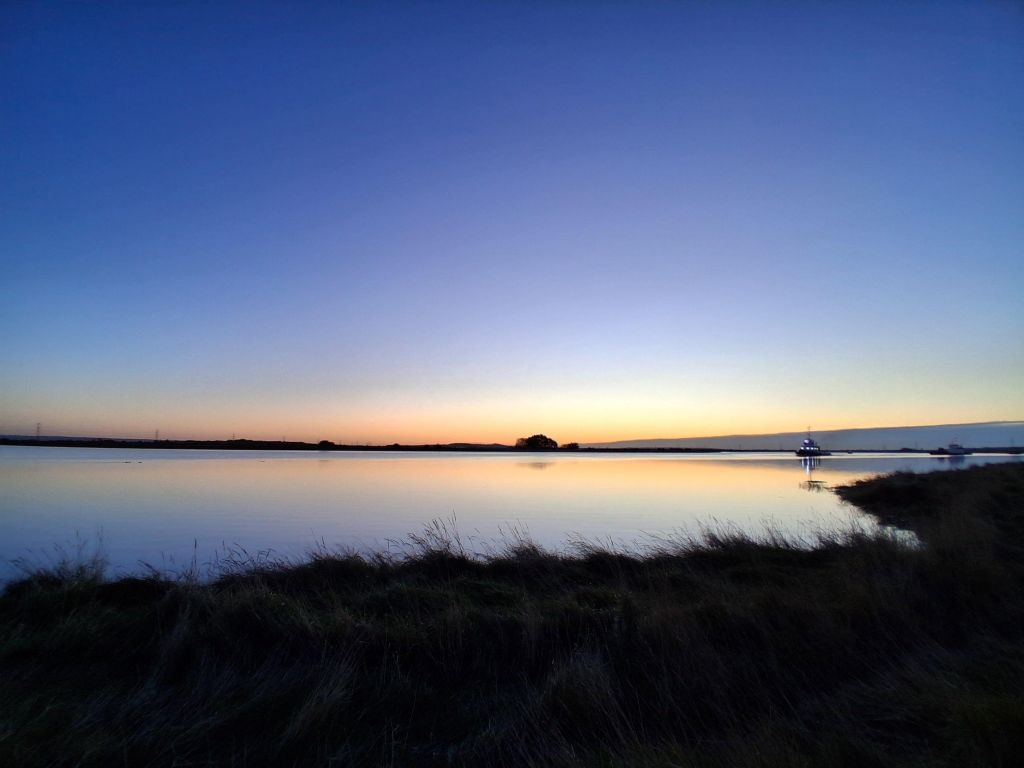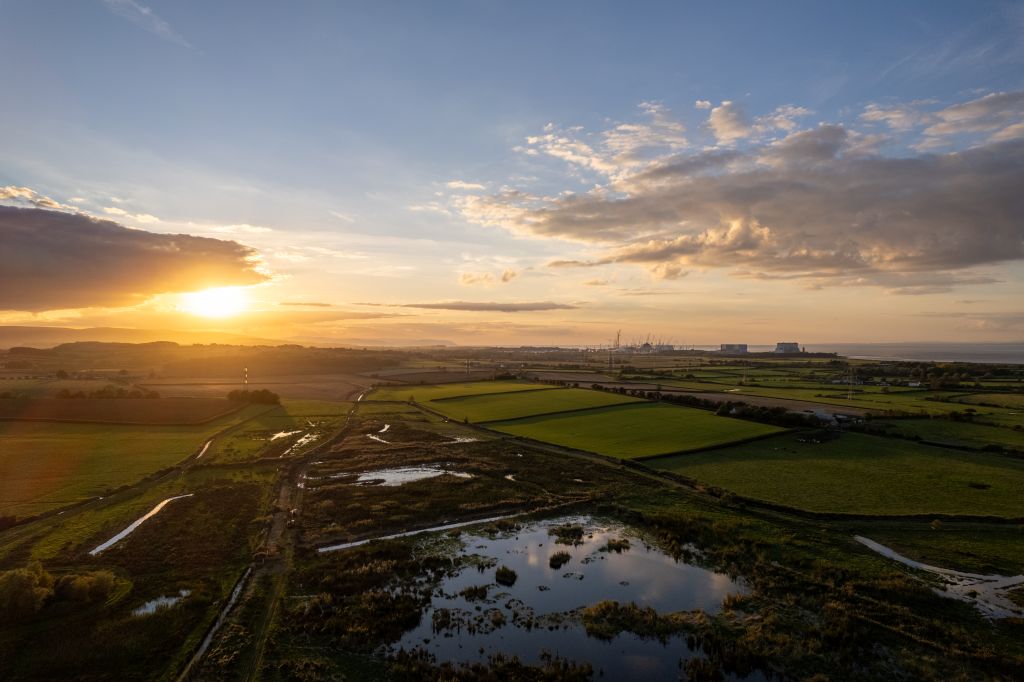WWT Steart Marshes thanks its pandemic volunteer stars!

At the start of National Volunteers Week June 1 - 7, Steart Marshes, run by the charity The Wildfowl & Wetlands Trust (WWT) has paid tribute to its army of volunteers who helped the site get through the past, difficult year.
The first volunteers to return took up engagement roles to speak to visitors, explain changes on site due to Covid-19, and generally inform people about the wildlife and where to see it. From practical tasks like hedge and path maintenance, to surveying birds and butterflies, about half of the 52 volunteers with the charity have so far been able to return to help make sure Steart Marshes came out of the pandemic in as strong a position as possible. At the same time, volunteers have spoken about how their work has helped with their own mental health. At Steart, this includes Somerset-based Richard Foyle (see below)
As WWT enters its 75th year, volunteers at all its ten sites across the country, including Steart Marshes, are delighted to be back at work, greeting visitors, helping reserve wardens, guiding tours and all of the many other tasks they carry out.
Nicola Stanford, Head of Volunteering at WWT, said the centre was immensely grateful to all its volunteers, including those who carried on working right through lockdowns but also those who have not yet been able to return but have expressed a readiness and willingness to come back when they can.
“We really couldn’t have done it without them,” she said. “It has obviously been an incredibly tough year for everyone and Steart Marshes is no exception.
“When it comes to things like wildlife you can’t just lock up and go home, so to know we had people all around the country willing to carry on helping where and how they could, even while our own staff were often on furlough and unable to come in, was extremely reassuring.
“I really want to pay tribute to all of them both those who have returned and those waiting to come back and say a huge thank you for all the work they have done, both before, during and since the end of the lockdowns over the past year. And as things hopefully start to get back to normal, I can’t wait to see them all back at Steart Marshes”.

Steart Marshes volunteers pulling ragwort on the reserve - picture taken pre-pandemic
As well as helping Steart Marshes, many of the volunteers have spoken about how the work they do is also beneficial to their own mental health. WWT recently launched a new scheme called Blue Prescribing which aims to promote wellbeing in people experiencing mental health problems and will start at WWT’s Steart Marshes site in the summer. Dr Jonathan Reeves, WWT’s Principal Research Officer (Health and Wellbeing) said there was growing evidence that being in nature can reduce stress, anxiety and depression.
“So many of our volunteers speak about how volunteering with WWT makes them feel better – not just because they feel like they belong to a community of like-minded people but also because being outside, around nature and in particular by wetlands really is a mood-booster,” he said.
“This has been particularly important over the last year, so it’s great to know many of our volunteers were able to keep working either between or even in some cases through all the different lockdowns.”
The health and wellbeing projects being piloted at Steart Marshes are funded by the government’s Green Recovery Challenge Fund. The fund is being delivered by The National Lottery Heritage Fund in Project Partnership with Natural England and the Environment Agency.
Volunteer case study

Left to right volunteers Roy Osborne, Richard Foyle and Dick Best, pictured at our last volunteer thank you event before the pandemic.
Richard Foyle from Somerset, volunteers at Steart Marshes in Somerset.
Richard lives in the small village of Stockland Bristol, right next to WWT’s Steart Marshes. He began volunteering in 2013 before the reserve opened. Now his work involves weekly practical tasks such as planting trees and their aftercare, strimming and drainage work. He is also involved with bird surveys, butterfly transects, saltmarsh plant transects and dragonfly monitoring; and he has led some guided walks on the reserve. He also enjoys supporting university students carrying out their project work.
“I was able to do some volunteering during the last lock down,” he said.“I was not very keen to work very closely with others during this time until I had been vaccinated, but the staff were very supportive and did a separate health and safety assessment of me to confirm that I would be able to do work on my own on the reserve.
“I was able to plant a lot of trees on the reserve during this period, something of a passion of mine!”
Richard said he particularly enjoys the volunteering work as it is helping to create new habitat and he was pleased to be able to make a small contribution to carbon capture through the salt marsh development.
“Volunteering makes me feel like I am giving something back,” he said. “I have always had an interest in nature, gained mainly from my grandma and dad. My job was in education so was very busy and based inside.
“Volunteering at Steart has enabled me to get involved in something exciting and nature based, it was right on my doorstep and the people have been so friendly and supportive, I am so grateful to them for taking me on board.
“The monitoring work I love as it provides scientific data for informing future work (I was a science lecturer so value the chance to be able to contribute in this area). I also love working with university students, I was out this week with a Masters student who is doing some research into eels and one of their parasites - I find it stimulating for me and love finding out more about what they are doing and hoping to achieve.”
Living next to Steart Marshes - which stayed open throughout he pandemic - had been particularly beneficial to him over the past year: “I live next to the reserve and I have a dog so we have been able to go onto the reserve most days,” he said.
For more information contact: info.steart@wwt.org.uk
Volunteering opportunities: https://www.wwt.org.uk/join-and-support/volunteering/volunteering-opportunities/
Corporate volunteering CTA/link for Linked In posts: https://www.wwt.org.uk/join-and-support/corporate-volunteering/
The Wildfowl and Wetlands Trust (WWT)
Wetlands are essential for all life, including humankind and yet they are disappearing three times faster than forests. The Wildfowl and Wetlands Trust (WWT) is a conservation charity working to save wetlands globally and in the UK for wildlife, people and our planet. WWT runs ten reserves across the UK, managing 3000 hectares of the best wetland habitat in the UK, and providing inspirational experiences to encourage people to value wetlands and the amazing wildlife they support.To find out more visit wwt.org.uk.



